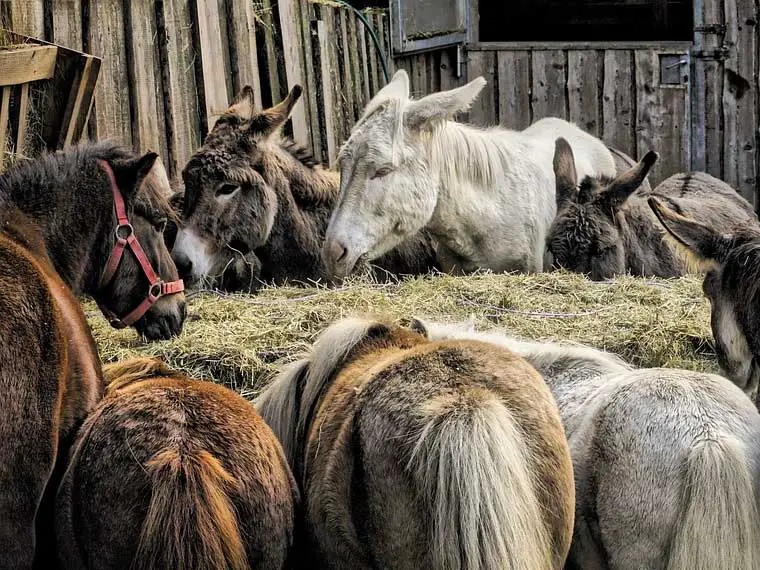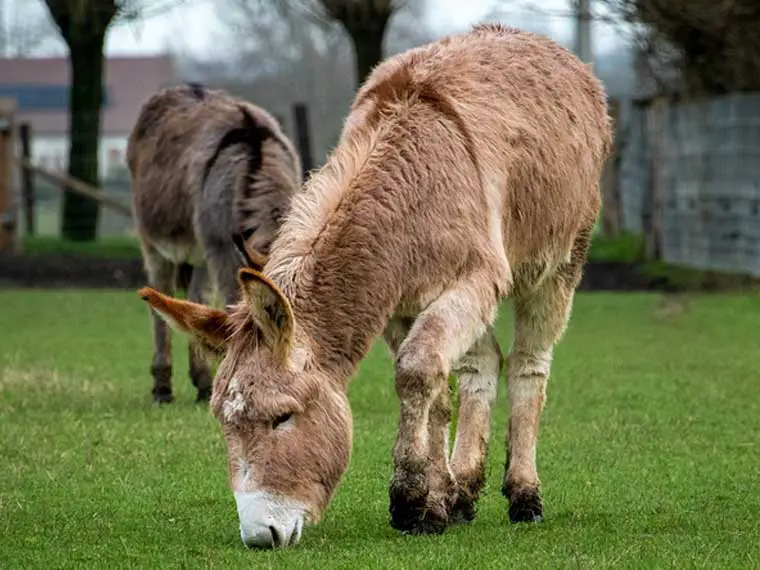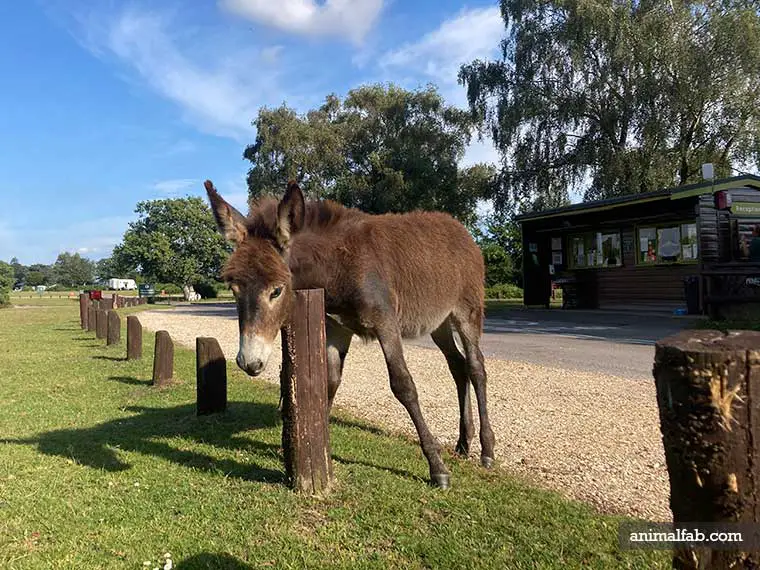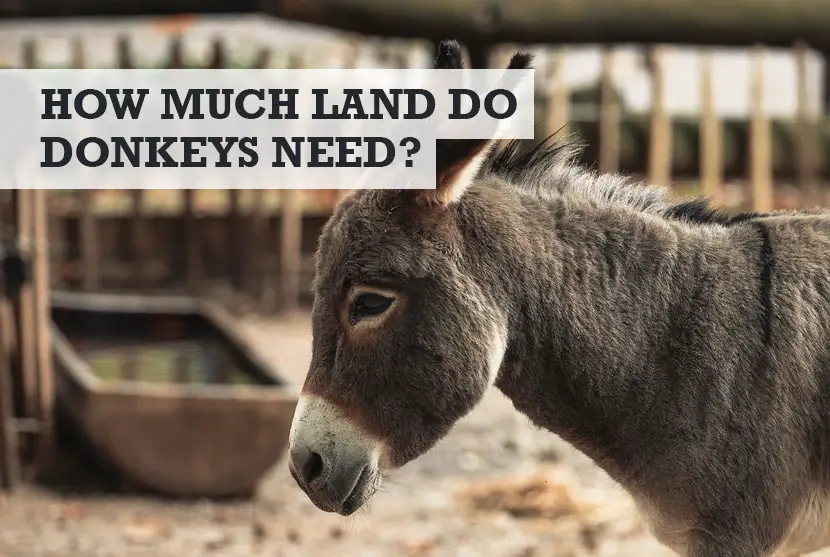Keeping donkeys happy and healthy involves a lot of work. One consideration is how much space donkeys need, even the mini and miniature ones. Below is a guide to how much land a donkey needs in acres so you can avoid over-crowding or mental health issues with your herd… short and simple answer first.
How much land does a donkey need? Standard donkeys need a minimum of 0.5 acres. Half an acre is enough space for a donkey to graze. However, if you have more land and space for your donkeys, that will almost certainly be a lot happier.
So, that’s how much land a standard donkey needs; about half an acre. But what about the space needed for miniature donkeys. Read on for that answer, and more on how many acres per donkey is best.
How much land does a miniature donkey need?
Just as with standard donkeys, I would not recommend anything less than 0.5 acres per miniature donkey. Whilst they are smaller, they are not that much smaller than other donkeys.
With that in mind, the amount of land needed for a miniature donkey should never be smaller than half an acre to graze on.

Do donkeys need a lot of land?
Donkeys need access to a lot of land for several reasons, including feeding, exercising and socialising. They are, generally speaking, sociable animals, so you would want to keep more than one donkey, preferably a small group of three or four.
Under optimum grazing and climactic conditions, each donkey will need approximately half an acre of pasture to roam in. The bigger the herd, the more extra land you will need to provide for horse play.
The land will need to be divided into paddocks in order to prevent overgrazing of the donkeys’ favourite spots.
Why donkeys need land and space
Most donkeys, that are kept in sanctuaries or as domestic pets, do not have to search for food. They have their meals provided. The challenge in keeping these pets happy is to ensure that they have companionship, stimulation and room to move.
However, donkeys need to eat little bits at regular intervals. They need to have access to a food source or to be kept in an area where they have opportunities to eat.

1. Foraging
The donkey digestive system is slow and is designed to extract nutrients out of the poorest quality food. It is not designed to metabolise foods rich in starch. Donkeys put on excess weight easily if they eat the wrong food. Therefore, they need a diet rich in fibre and low in nutrition, such as straw.
Donkeys are indiscriminate feeders that can both browse and graze. They are happy to eat grass, leaves and even bark. The ideal vegetation for a pet donkey would include a variety of grasses, shrubs and trees.
In this kind of habitat, in order to get enough exercise, donkeys will need a greater range than the half an acre recommended when living on pasture.
2. Grazing
Donkeys should not be grazing on grass as their primary source of nourishment. Their diet should consist mostly of straw or meadow hay. These can be provided in a designated feeding area.
This does not stop donkeys from tucking into tasty grass when they have the opportunity to do so. They will also tear up the roots of the pasture if the mood takes them.
Care must be taken that your donkeys do not overindulge on lush pasture and become obese, and also, that they do not destroy the pasture by overgrazing.
A half acre of space per donkey is the minimum pasture land needed, and this should be divided into paddocks so that heavily grazed areas can be given opportunities to rest.
3. Shelter
Donkeys are designed to live in arid areas where they can tolerate hours of direct sunlight and heat. However, they do appreciate shade and do not enjoy being cold or wet.
In your planning for your donkey emporium, allocate at least 40-50 square feet of covered area, per donkey, for their sleeping area. This type of shelter should have walls on at least three sides, to keep out the elements and to make the donkeys feel safe.
You should also consider providing an open air, covered area for daytime use. This will provide shelter when it rains and will keep food dry in the feeding troughs. Damp, mouldy straw produces toxins.
4. Exercise
Donkeys who are kept in captivity without having to work, will need outlets for their energy, else they lose condition and put on weight.
The younger and more energetic your donkeys are, the more space they will need in which to frolic, especially when they play games with each other.
Toys, that have been designed especially for horses and donkeys, provide stimulation and much needed exercise, and are ideal for donkeys living on their own.

5. Interaction
Donkeys are herd animals and enjoy interacting with one another. Young donkeys will indulge in play fighting, rearing up and nipping each other. They can also be seen chasing each other round their pens.
When dividing the land, create long enough areas to allow the donkeys to pick up speed when running.
Some donkeys are not particularly sociable and will need their own spaces. This may require the creation of additional paddocks and segregated sleeping quarters.
6. Breeding
If you are breeding donkeys, you need to be aware of the donkey social structure, and provide separate facilities for mating herds.
An intact, dominant male will control a harem of jennies. He will not tolerate rivalry from other male upstarts, and may injure them while protecting his females.
Other farm animals on the land
There is ample evidence that suggests that donkeys live happily with other farm animals, and even household pets. Even so, you want to take care to allocate separate feeding areas for your donkeys.
Cows, for example, have a much higher need for nutritional food that donkeys. Their food could cause your donkeys to develop health problems.
Donkeys should not have access to cattle licks as these invariably contain urea which could be toxic for donkeys. Also, donkeys do not lick them, they bite off whole chunks.
Some animals, such as goats, are not selective where they drop their faeces. These could easily end up in the donkey feed trough so it is best to keep the donkey food away from common areas.
Signs that a donkey needs more space
Even if you have 0.5 acres per donkey, they might still yearn for more land. Here are the signs to watch for that you might have an unhappy donkey on your hands.
- Backing away from humans.
- Distressed braying at night.
- Pinning their ears back close to their neck.
- Holding their head high (could indicate that they might be spooked or ready to bolt)
- Lightly to moderately pawing at the ground or stomping.
- Raising one of their legs.
- Flaring their nostrils or snorts a lot.
- Tightening their mouth and muzzle muscles.
- Squinting or darting their eyes.
- Rapidly swishing their tail.
- Full body trembling or shaking.
- Showing you their teeth or biting you.
- Having widely open eyes to the extent that you see the whites of their eyes.
Management of the land your donkeys graze on
1. Paddocks
There are several reasons why you need to create paddocks for your donkeys. If you have acres and acres of land, you want to be able to keep track of their whereabouts. They are capable of wandering over vast territories.
If land is limited, you need to move your donkeys regularly between pastures so that they do not destroy the vegetation. You may also want to limit access to a patch of lush grass in high season because it is too rich for your donkey’s diet.
If there are areas of the land that become muddy during the rainy season, you need to keep the donkeys away from it. Their feet are not designed for boggy conditions and they may develop fungal infections.
You may also need separate paddocks to cater for the needs of different donkeys. For instance, boisterous youngsters could disturb or injure cantankerous senior citizens, and mating pairs or groups need to be kept apart from rival males.
2. Fencing
Strong fences are needed to keep donkeys in check. If a donkey is determined to escape an enclosure, it will bite, chew and kick at its fencing. Sturdy post fencing or wire mesh, at least four feet high, will keep them in. The fencing needs to be secured to posts, at most, ten feet apart.
Electric fencing can be used to deter predators and rodents but it, too, needs to be sturdy. Donkeys soon learn to know if the power is switched on or not. They will try to escape a flimsy fence, and could get entangled in the wire.
Leave a gap at the bottom of wire fencing so that the donkeys do not get their feet caught.
3. Poop control
Donkeys tend to use the same area repeatedly for their ablutions. This midden needs to be cleared at least twice a week, for hygiene purposes.
The manure can be spread across the pasture to nourish the land, or it can be moved to a compost heap. Because of the donkey’s diet, it is usually drier and more fibrous than cattle manure and will spread easily.
Do not use it as compost, by putting it directly onto your garden or vegetable patch. It needs to be ‘hot’ composted first in order to destroy any unwanted seeds it may contain.
4. Pasture management
Limited pasture lands, inhabited by donkeys and other farm animals, need to be managed carefully to prevent overgrazing. Each paddock needs to be rested for at least 12 weeks before allowing the animals back. This allows enough time for the grass to re-establish itself, and for host-dependent parasites to die off.
In early spring, the fields should be weeded and reseeded in order to provide sustenance for the summer months.
Conclusion
Unless you have ample space on your land for donkeys, please don’t more, breed them, or buy one in the first place. Donkeys are sensitive animals with emotions, and can quickly become depressed if they don’t have enough space to move around and live in.
You might also like…
- Tips for keeping a donkey warm in winter months
- How to win the trust of your donkey
- Signs that your donkey is pregnant
Image in header via https://unsplash.com/photos/b1vCFneOP8w

